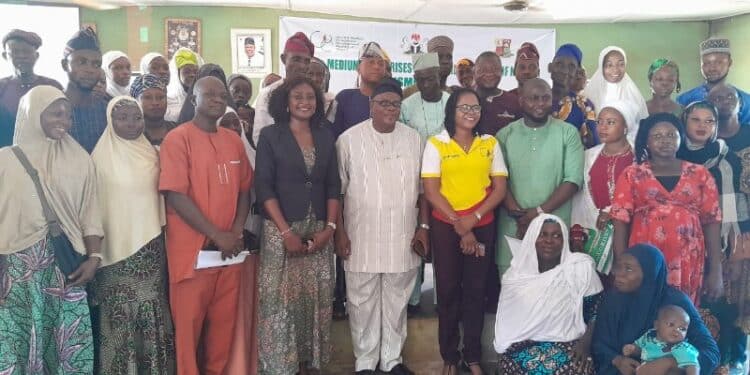No fewer than 50 beneficiaries have benefitted from the federal government’s move to stimulate rural enterprises to address the nano sector’s challenges.
The Director General of the Small and Medium Enterprises Development Agency of Nigeria (SMEDAN), Olawale Fasanya, stated this at the opening of the Cluster Development Programme, held at the Iseyin local government’s secretariat.
Fasanya, represented by Mrs Bimpe Fawale, Deputy Director of the Partnership and Coordination Department at SMEDAN, said the cluster initiative was organised to revitalise rural economic growth.
He said the programme targeted the Iseyin Aso–Oke cluster in Oyo State with 50 beneficiaries.
Fasanya said: “Cluster initiative has rapidly attracted attention of many governments and industry organizations around the globe as a means to stimulate urban and rural economic growth.
“The purpose of cluster initiative organisations is to promote economic development by improving the competitiveness of one or several specific business sectors.
“The initiatives are projects that are organised as collaborations between a diverse number of public and private sector actors.”
Fasanya stated that Nano, Micro, Small and Medium Enterprises (nMSMEs) sub-sector have historically played an important role in contributing to economic development of many countries worldwide.
According to him, the sub-sector accounts for most of the enterprises in Nigeria and the highest number of jobs created in Nigeria’s economy.
“The most recent National nMSMEs Survey of 2021 revealed that there are 39.6 million nMSMEs, employing 62.5 million persons 80.2 per cent of labour force and contributing 46.31per cent and 6.21 per cent to nominal GDP and exports, respectively.
“However, the Nano Enterprises constitute the highest percentage,” he said.
Fasanya stated that despite the immense contributions, the sub-sector, especially the Nano Enterprises, were still plagued by many challenges.
According to him, the challenges included inadequate access to affordable funds, the high cost of doing business, inflation, insecurity preventing farmers from visiting their farms, a lack of management skills, a lack of access to local, regional, and global markets, a lack of linkages to large enterprises, poor infrastructure, and so on.
He said in the last survey jointly conducted by SMEDAN and the National Bureau of Statistics, more than two million nMSMEs closed shop between 2017 and 2021, releasing more than six million Nigerians into the unemployment market.
“In our determination to address these challenges confronting the nMSMEs in Nigeria, the agency came up with this intervention programme ‘Cluster Empowerment Initiative’ to reinvigorate the rural enterprises.
This is to also mainstream them into the formal sector and to cushion the effects of the economic downturn on nMSMEs in Nigeria.
The SMEDAN boss stated that the program was designed to provide an end-to-end business development service to the rural entrepreneurs and business owners, who are at the bottom of the pyramid.
He said it was as a supportive mechanism to enhance rural entrepreneurship, enterprise output, competitiveness, job creation and financial inclusion.
“The intervention programme has three components, which are sensitization, capacity building and empowerment to further support nMSMEs in Nigeria.
“The agency has equally designed and is implementing other intervention programmes,” Fasanya said.
In his remarks, the Chairman of Iseyin Local Government Oyo State, Hon. Mufutau Abilawon, commended the federal government and SMEDAN for implementing the programme.
“We are happy for the empowerment given to Aso Oke weavers and want more.
“The association of Asooke Weavers also are doing a lot to export aso oke to the world but more support is required,” Abilawon said.










